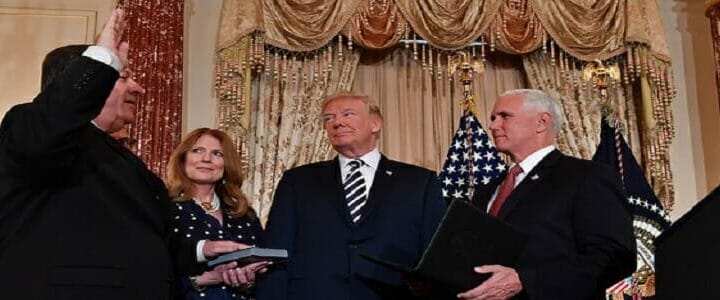Mike Pompeo has been secretary of state for three and a half weeks, but he hasn’t spent a lot of time in the public eye in that time. Other than a brief appearance for reporters at the State Department on May 7 and a slot on Fox News Sunday on May 12, Pompeo has been at work. On Monday, he chose the conservative Heritage Foundation think tank to make his first public policy speech since his confirmation.
It was a fitting coming out for Pompeo. Heritage staffers formed the early core of President Trump’s transition team, and most of the traditionally conservative policies the Trump administration has adopted have come from the policy wonks on its staff. Pompeo used the occasion to deliver his most vigorous defense of the president’s decision to withdraw from the Iran nuclear deal — the Joint Comprehensive Plan of Action, or JCPOA — and to deliver a message directly to the Iranian people.
Trump ended America’s participation in the JCPOA two weeks ago, Pompeo said, for one simple reason: the deal “has failed to guarantee the safety of the American people from the risks created by the leaders of the Islamic Republic of Iran,” adding a stern, “No more,” for emphasis.
Predictably, the Iranian government did not take kindly to Pompeo’s speech. “The world today does not accept that the United States decides for the world,” said Iranian President Hassan Rouhani.
Quds Force in Europe?
The deal’s sunset provisions, which would allow it to resume most of its nuclear activities after 15 years, set-up the Iranian regime for a “quick sprint to the bomb,” Pompeo warned. After all, as the Israelis recently revealed, Iran was working towards a specific number of warheads of a specific yield all along, despite its insistence that its nuclear program was for “purely peaceful purposes.”
Rather than use the returned frozen assets to improve the lives of its citizens, Pompeo accused the Iranian government of “spending its newfound treasure fueling proxy wars across the Middle East, lining the pockets of the Iranian Revolutionary Guards Corps, Hezbollah, Hamas, and the Houthis.”
But among the usual litany of Iranian transgressions, Pompeo threw in one particularly specific charge regarding the Quds Force, the elite unit within the IRGC that is responsible for exporting the Iranian Revolution by supporting other militants around the world. I hadn’t heard this charge before, and Pompeo did not elaborate, but his statement has not received the attention it deserves.
“Today,” the secretary said, “the Iranian Quds Force conducts covert assassination operations in the heart of Europe.”
It’s no surprise that the Quds Force is responsible for murder and mayhem — what al Arabiya called its “extensive record of assassinations [and] bombings,” saying it had “perfected the art of terrorism.” But the idea that there are ongoing Quds Force assassination operations in Europe is something new.
Plotting in America
In 2011, the FBI arrested Manssor Arbabsiar, an Iranian-born American citizen, at New York’s John F. Kennedy Airport. The U.S. Attorney charged Arbabsiar, whose cousin was a senior officer in the Quds Force, with plotting to assassinate the Saudi Arabian ambassador the the United States. He pleaded guilty to “one count of murder-for-hire, one count of conspiracy to commit murder-for-hire, and one count of conspiracy to commit an act of terrorism transcending national boundaries” in 2012, and received a 25-year sentence in 2013.
And other Quds Force operations in various garden spots are also well known. But there is precious little information about active and ongoing covert assassination operations in Europe. One suspects that Pompeo, who you’ll recall served as director of the Central Intelligence Agency before moving to Foggy Bottom, was speaking directly to Tehran on that one.
No doubt there are intelligence operatives from multiple countries closely watching certain individuals to record their reactions. Are they going to ground? Bugging out? Accelerating their plans?
This is thread to be pulled. Stay tuned.


